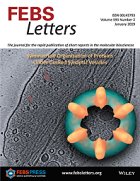|
Literature / Source Database:
FEBS Letters
Description
An international journal established for the rapid publication of essentially final short reports in the fields of molecular biosciences.
FEBS Letters is published by Elsevier on behalf of the Federation of European Biochemical Societies
| Title (short) |
FEBS Lett. |
| CODEN |
FEBLAL |
| Languages |
English |
| First year |
1968 |
| Impact factor |
3.519 |
| Editor |
Felix Wieland |
|
|

|
Status
active
Subject

Source type
Journal
Publisher
ISBN ISSN
0014-5793
E ISSN
1873-3468
First volume
1
Last volume
593+
Homepage
| Resources |
|
Availability |
|
|
|
|
|
| Text PDF |
 |
free access |
 |
| Text Html |
 |
for subscriber |
 |
| References |
 |
not available |
 |
| Abstracts |
 |
|
|
| TOC |
 |
|
|
|
|
|
|

Source type
Journal
Publisher
ISBN ISSN
0014-5793
First volume
1
Last volume
589+
Publish city
Amsterdam
Homepage
| Resources |
|
Availability |
|
|
|
|
|
| Text PDF |
 |
free access |
 |
| Text Html |
 |
for subscriber |
 |
| References |
 |
not available |
 |
| Abstracts |
 |
|
|
| TOC |
 |
|
|
|
|
|
|

Description
FEBS Letters is one of the world's leading journals in biochemistry and is renowned both for its quality of content and speed of production. Bringing together the most important developments in the molecular biosciences, FEBS Letters provides an international forum for Minireviews, hypotheses and research letters that merit urgent publication.
FEBS Letters offers:
• Faster publication:
− Accepted articles are published online in 3 days
− The print version of the article is published in 3 to 5 weeks after acceptance
• Full-text article disclosure in HTML and PDF formats
• Articles in Press are included in PubMed
• Easy online manuscript submission system
• Transparent online peer review and manuscript tracking system
• No page charges
• Free color figures
Subject Coverage:
The subject area of FEBS Letters is broad. It covers biochemistry (including protein chemistry, enzymology, nucleic acid chemistry, metabolism, and immunochemistry), structural biology, biophysics, computational biology (genomics, proteomics, bioinformatics), molecular genetics, molecular biology and molecular cell biology (signal transduction, intracellular traffic, regulation of cellular proliferation, cell-cell interactions) and systems biology. Studies on microbes, plants and animals at the molecular level are within the scope of FEBS Letters.
|